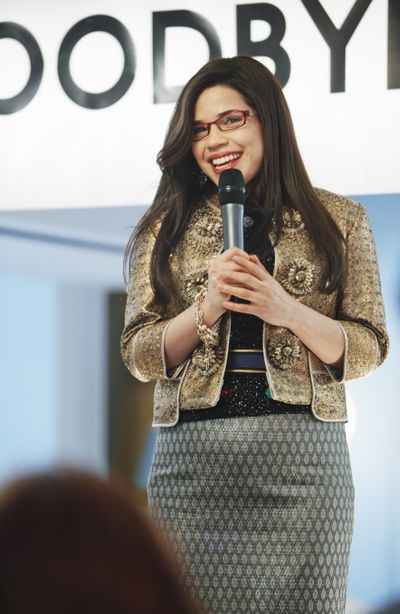‘Ugly Betty’s last song
Fans lament ending to show that touched on provocative topics

During its four-year run, ABC’s “Ugly Betty” skewered the New York fashion world, nabbing celebrity cameos from the likes of Lindsay Lohan, Shakira and Isaac Mizrahi.
It turned America Ferrera, who played the plucky but style-challenged Betty Suarez, into a household name. And it landed a prestigious Peabody Award.
With the credits ready to roll on the wacky dramedy’s last episode, airing Wednesday, Latino, gay rights groups and fans are lamenting more than the loss of Betty’s cringe-inducing outfits and the melodrama of the Meade family – owners of the show’s fictional fashion magazine Mode.
The hourlong show was also among the rare network programs to tackle such controversial issues as gay teens, body image and illegal immigration.
It contrasted Betty’s career at Mode with her working-class, Mexican immigrant family, including her widower father Ignacio, impulsive older sister Hilda and theater-loving, fashion expert nephew Justin, who came out as gay in this last season.
“Having this family at the center of the show made it normal to watch a Latino family in a nonstereotypical way,” Ferrera said in an e-mail interview.
Lisa Navarrete, a vice president for the National Council of La Raza, said the show’s absence will leave a void.
“You don’t have a lot of Latino-themed shows on TV, so when we lose ‘Ugly Betty,’ we will have a major loss,” she said.
Navarrete noted that George Lopez paved the way for “Ugly Betty” in 2002 with his Bill Cosby-styled family sitcom, but she called “Ugly Betty” edgier.
The brainchild of producer Silvio Horta and actress/producer Salma Hayek, “Ugly Betty” was based on a Colombian telenovela that became so popular it was copied in Mexico, Germany and elsewhere.
The English version also proved a global hit. More than 10,000 Facebook fans from as far as England, the Philippines and Bangladesh have begged ABC not to cancel the show, which suffered a ratings decline amid an ever-changing schedule.
Shortly after the height of the immigration debate, the show followed Betty’s father as he confessed to his American-born children that he had been living in the U.S. illegally.
Even with comedic turns, “the plot line illustrated the complexity of the lives of many undocumented immigrants who are otherwise integrated into American life,” Navarrete said.
“You have a lot of families like ‘Ugly Betty’ where you have U.S.-born children whose parents have undocumented status.”
More groundbreaking was the show’s handling of its gay and transgender characters, said Jarett Barrios, president of the Gay & Lesbian Alliance Against Defamation.
Although initially played for laughs, “Ugly Betty” provided a sympathetic portrait of Meade scion Alex, who transforms into the stunning Alexis. And it followed the bumpy love life of Mode’s gay fashion assistant Marc St. James.
But most of all, it showed how Betty’s family accepted without fanfare Justin’s love for musicals and the latest fashion trends, a tacit acceptance of his sexuality. Then, in this final season, Justin got his first kiss with a boy.
Barrios said too often gay characters are depicted on TV as adults without families.
“A gay teen is also a son, a nephew, a grandson,” he said. “As a man who is both Latino and gay (and a father), I liked the show because it depicted really my own experience and that of so many others in the United States.”
Said Ferrera: “There are certain things that people just don’t expect anyone on television to talk about and whenever we dared to go there, it would make some people uncomfortable.
“But the only way to really make an impact and to inspire people to think is to venture into risky territory.”